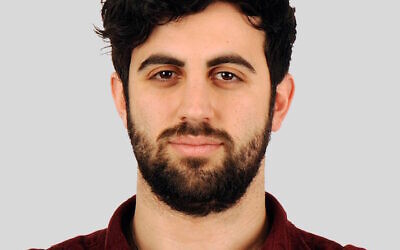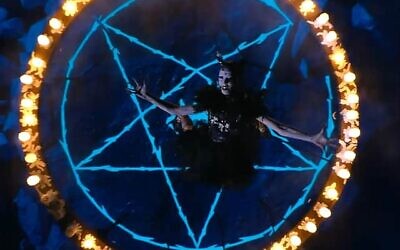OPINION: Holding on in this mysterious ride is our beautiful, terrible destiny
Watching Israel’s Eurovision entry was to witness the immense burden of Jewish history on the shoulders of one courageous young woman
I didn’t cry on October 7. I didn’t cry on October 8 either. Nor on any of the more than 200 days that followed. I felt horror, anguish and dread, but often I felt numb too. It took Eden Golan to make me cry. And not in a Bambie Thug kind of way. The first time I saw Eden perform Hurricane, Israel’s Eurovision entry, something snapped.
Partly it was just the haunting power of the song, which had murder and kidnap and rape woven into its every syllable, even as the lyrics had been stripped of any direct reference to the cataclysm in question. There was also something heartrending about seeing a 20-year-old girl sing with grace and courage under extraordinary pressure.
More than that, however, what pierced my emotional armour was a sense of the crushing weight of Jewish history being carried on Eden Golan’s shoulders. Why couldn’t she just be another young pop singer camping it up for her country at Eurovision? Why must so many of our sons and daughters risk their lives to sustain the existence of their homeland?
Why always us? I’ve wondered this so many times since October 7.

In Britain, during the endless rows over antisemitism that defined the Corbyn years, I often thought how nice it would be for Jews to be out of the headlines for a while. Why couldn’t we be more like, I don’t know, Sikhs, or Buddhists – there are as many Buddhists in Britain as Jews, but you really wouldn’t know it from reading the papers.
After Corbyn lost, my dearest wish was that we could all stop talking about Jews for a while. But here we are a few years later and our own strange little identity is plastered all over media and social media daily, as though it’s a public good, to be argued over like green energy or immigration. Even if you’re an optimist about Jewish life in Britain, as I still am, it really is draining to observe this rolling debate about just how much and in precisely what way millions of people hate you.
And yet, was it not ever thus? Isn’t this really just the resumption of normal historical service? Much has been said in the aftermath of October 7th about the end of the Jewish “holiday from history”. The argument goes that, among the many things shattered that day was the comfortable equilibrium of diasporic life that has endured these past 50 years or so. A half century in which Israel’s existence was, broadly speaking, secure. In which antisemitism was not, for most people, a daily concern. And in which we diaspora Jews were able to enjoy our protected status as the people that survived the Holocaust, while also benefiting from the knowledge that our ultimate security was no longer in the hands of our fickle neighbours, but a nuclear-armed pocket superpower in the Middle East.
That was all rather nice, wasn’t it? And yet, while the long term effects of October 7 remain to be seen, it seems likely that this illusory equilibrium was also snatched away by Hamas. That it’s gone and will not return any time soon. Regardless of our feelings towards it, Israel has dragged the rest of us out of the eddy and back into the rapids.

We now reside once more in a world where pogroms happen in broad daylight and are celebrated. Where baying crowds fill European squares bearing slogans of hate. Where people are compiling lists of Jews and seeking to evict them from public life.
Of course the circumstances today differ somewhat, as does the moral calculus: the Jews in Israel are not pure victims, they wield a far sharper power, meaning Palestinians bear the brunt of this conflict’s awful losses. But the outcomes for Jews feel eerily familiar.
To be Jewish means to be hated and to be loved, but rarely ignored. To be singled out and also to single yourself out. To feel the blessing of belonging and the curse of being trapped in a moth-like tribe that cannot resist a flame.
Not all Jewish history has been like this of course, but it’s hard not to feel something akin to what Friedrich Nietzsche called “eternal recurrence”, that somehow every pain and sorrow felt by our ancestors will also punctuate our lives and the lives of our grandchildren. That battling antisemitism is truly a Sisyphean task. It’s there in Vehi Sheamda of course, arguably our central creed: in every generation, they rise up to destroy us.
And yet it is another Nietzschean idea that has been on my mind since watching Eden Golan. The concept of “amor fati”, a love of one’s fate. The sense that it is not our destiny as sentient beings to simply be happy, but also to feel pain again and again. And only accepting that inevitability makes the human condition comprehensible or even bearable.

All the more so for the Jewish condition. Because we know that, for reasons too numerous to recount here, when the world sneezes, the Jews usually catch a cold. That to be Jewish means to be hated and to be loved, but rarely ignored. To be singled out and also to single yourself out. To feel the blessing of belonging and the curse of being trapped in a moth-like tribe that cannot resist a flame. To live with jeopardy and intensity and the motors of identity revving away ceaselessly inside us. A people chosen to find itself at the apex of history, again and again and again. “Dancing in the storm, holding on in this mysterious ride,” as Eden sang. This is our beautiful, terrible destiny and if we wish to maintain our sanity along the way then we must love it, even as it makes us cry.
Mark Twain described us best in Concerning the Jews, his famous 1899 essay about how the Jewish people persist even as the empires that seek to destroy them rise and fall. The Jew today, he wrote, “is now what he always was, exhibiting no decadence, no infirmities of age, no weakening of his parts, no slowing of his energies, no dulling of his alert and aggressive mind”. Our fate has made us this way. Our fate is to exist in the eye of history’s hurricane. I wouldn’t change it, even if I could.
• Josh Glancy is News Review editor at The Sunday Times. You can read more of his Jewish News columns HERE

Thank you for helping to make Jewish News the leading source of news and opinion for the UK Jewish community. Today we're asking for your invaluable help to continue putting our community first in everything we do.
For as little as £5 a month you can help sustain the vital work we do in celebrating and standing up for Jewish life in Britain.
Jewish News holds our community together and keeps us connected. Like a synagogue, it’s where people turn to feel part of something bigger. It also proudly shows the rest of Britain the vibrancy and rich culture of modern Jewish life.
You can make a quick and easy one-off or monthly contribution of £5, £10, £20 or any other sum you’re comfortable with.
100% of your donation will help us continue celebrating our community, in all its dynamic diversity...
Engaging
Being a community platform means so much more than producing a newspaper and website. One of our proudest roles is media partnering with our invaluable charities to amplify the outstanding work they do to help us all.
Celebrating
There’s no shortage of oys in the world but Jewish News takes every opportunity to celebrate the joys too, through projects like Night of Heroes, 40 Under 40 and other compelling countdowns that make the community kvell with pride.
Pioneering
In the first collaboration between media outlets from different faiths, Jewish News worked with British Muslim TV and Church Times to produce a list of young activists leading the way on interfaith understanding.
Campaigning
Royal Mail issued a stamp honouring Holocaust hero Sir Nicholas Winton after a Jewish News campaign attracted more than 100,000 backers. Jewish Newsalso produces special editions of the paper highlighting pressing issues including mental health and Holocaust remembrance.
Easy access
In an age when news is readily accessible, Jewish News provides high-quality content free online and offline, removing any financial barriers to connecting people.
Voice of our community to wider society
The Jewish News team regularly appears on TV, radio and on the pages of the national press to comment on stories about the Jewish community. Easy access to the paper on the streets of London also means Jewish News provides an invaluable window into the community for the country at large.
We hope you agree all this is worth preserving.






















